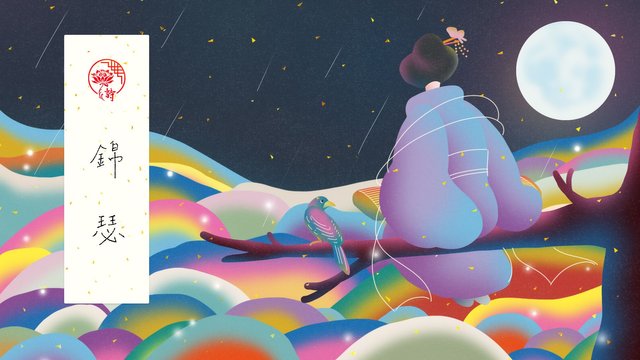Chinese poem - “Jin Se” by LI Shangyin (Includes original song and video) | 《錦瑟》- 李商隱(內有原創樂曲及影片)
The famous Chinese kung fu fantasy author GU Lung once said “There are some in this world who live in their memories. This may not be ideal but is forgivable because their past is so deeply embedded in their heart.” We all have memories, and this week’s poem is about a poet’s memory.
When we think of unhappy memories we will usually find a loved one's shoulder to cry on. Yet in the old days when people reminisce the past they would pour out their sorrows and feelings into words and poems.
LI Shangyin was a charming and talented scholar, admired by many ladies in his days. He often wrote love poems for his admirers, and these became his most well known works. Rumour has is that LI wrote “Jin Se” in memory of his wife, yet others says it was written for a maid who work for his mentor. Either way, reading between the lines you can feel his sorrow for the love that will never be again.
The “Se” in the poem’s title is the name of a Chinese ancient string instrument. It is usually used to accompany the “guqing”, another string instrument most favoured by scholars in the old days. The sounds of se and guqing blend well together in a harmonious way, and poets often used them as analogy for a couple's relationship. If the poet is the guqing, his wife or lover is his se. It is especially heartbreaking to listen to music from the se when his other half is no longer there, as that brings back all the sorrowness.
So let's take a look at “ The Beautiful Se” (Jin Se) now and try to understand Li’s emotions.
武俠小說家古龍曾說過:「在這個世界上有一種人永遠都活在回憶裡。這種人固然不對,卻是值得原諒的,因為他們的往事實在太刻骨銘心。」這次為大家介紹的主題,正是人生中不可避開的題目:「回憶」。
古人回憶往事,不像現代人一樣依偎在愛人的懷裡哭泣。他們選擇將情感寄託於文字,寫出一首首懷古詩、懷人詩,然而我們依然能夠在字裏行間感受到詩人真摯的情感。
作者李商隱風流倜儻、才華出眾,令無數女子傾心。而李商隱經常寫情詩贈予佳人,因此最為後人熟悉的是他所寫的愛情詩。傳聞《錦瑟》一詩便是李商隱悼念亡妻王氏所寫;又有推測《錦瑟》是李商隱懷念年青時期,與恩師令狐楚府中的侍女相戀的回憶。無論李商隱此詩是否憶念女子而寫,詩中所流露出的淡淡哀傷,似乎在緬懷逝去的年華。
詩名《錦瑟》,其中「瑟」是中國的傳統彈撥弦樂器,「宮、商、角、子、羽」的五聲調式可以覆蓋八度音程。「瑟」經常作為古琴的伴奏樂器,由於琴與瑟音色非常協調,因此古人常以「琴瑟和鳴」比喻相處融洽的夫婦關係。假如詩人是「琴」,失去了常年陪伴的「瑟」,也就缺少了一個重要的伴侶。當聆聽瑟聲演奏時,不禁回憶與伴侶昔年相處的片段,心情自然患得患失。
讓我們一起透過鑒賞詩句,感受李商隱聆聽瑟聲時所產生的豐富情感吧!
The Beautiful Se (Jin Se) by LI Shangyin《李商隱-錦瑟》

錦瑟無端五十弦,一弦一柱思華年。
jǐn sè wú duān wǔ shí xián ,yī xián yī zhù sī huá nián
莊生曉夢迷蝴蝶,望帝春心託杜鵑。
zhuāng shēng xiǎo mèng mí hú dié , wàng dì chūn xīn tuō dù juān
滄海月明珠有淚,藍田日暖玉生煙。
cāng hǎi yuè míng zhū yǒu lèi , lán tián rì nuǎn yù shēng yān
此情可待成追憶?只是當時已惘然。
cǐ qíng kě dài chéng zhuī yì ? zhī shì dāng shí yǐ wǎng rán

The Composition 詩句大意
There are eight lines in The Beautiful Se (Jin Se), and is best explained in six parts.
《錦瑟》共八句,按詩的結構劃分,可分為六個層次。
Part 1 : Memories aroused by the se 層次一:由錦瑟引起的思念
「錦瑟無端五十弦,一弦一柱思華年。」
jǐn sè wú duān wǔ shí xián , yī xián yī zhù sī huá nián
The se has 50 strings, the sounds from each string brings back wonderful memories
解釋:錦瑟無緣無故有五十條弦,每根弦所發出的每個音節都會令人懷思美好的年華。
Part 2 : Drifting back into memories 層次二:聽見「適」的瑟聲,回憶昔年而產生迷茫的感覺
「莊生曉夢迷蝴蝶」
zhuāng shēng xiǎo mèng mí hú dié
I'm like *Zhuang Sheng, and have become a butterfly in my dreams
*Zhuang Sheng was a philosopher in the 4th BC who dreamt of himself becoming a butterfly, flying around happily around. When he woke up, he wondered, did I just dream about being a butterfly, or am I now dreaming about me being Zhuang Sheng? Which is dream, which is reality?
解釋:我像莊子一樣,在夢中化作蝴蝶而迷茫。
典故:莊周夢見自己身化為蝶,自由自在地在慕間飛舞,完全沉醉於蝴蝶的角色,沒有意識到自己是一名叫做「莊周」的人;後來夢醒,自己的身份回復了「莊周」的角色,不再意識到自己是一隻蝴蝶,於是莊子開始思考到底何謂真正的現實、夢境。
Part 3 : Being persistent 層次三:聽見「怨」的瑟聲,回憶昔年而想起苦苦追尋的執著
「望帝春心託杜鵑」
wàng dìchūn xīn tuō dù juān
I have become a cuckoo like *Wang Di, crying out my sorrows
*Wang Di was rumoured to be King from around 1000 BC who became a cuckoo after he died. Every spring the cuckoo would call out for his love one in a very sorrow sound until his mouth bled.
解釋:我像望帝化作杜鵑鳥,以悲鳴寄託春心的哀怨
典故:望帝是傳說中周朝末年蜀地的君主,名叫杜宇。後來禪位退隱,不幸國亡身死,死後靈魂化為一隻杜鵑鳥。每到暮春都會苦苦啼叫,寄託對愛情理想的追求,直至口中流血,聲音非常哀怨悽悲。
Part 4 : Feeling lonely when I think of the past 層次四:聽見「清」的瑟聲,回憶昔年而產生寂寥的感覺
「滄海月明珠有淚」
cāng hǎi yuè míng zhū yǒu lèi
The moon shines above the sea, and the tears from the mermaid become pearls lying on the seabed.
During the bright moon, clams will open up for the moonlight to shine on the pearls. Another saying is that when the moon shines on the tears from the mermaid, they will become pearls
解釋:滄海明月高照,人魚流下的淚水皆化成遺留於海底的珍珠
典故:蚌生長於海,傳說每當月明宵靜,蚌則向月張開貝殻,以月光滋養裡面的珍珠。當珍珠汲收月光精華,便會發出螢光。另外亦有傳說人魚在月光映照時流下的眼淚,便變成一顆顆珍珠。
Park 5 : Reminiscing, is it reality or fantasy 層次五:聽見「和」的瑟聲,回憶昔年而產生朦朧的感覺
「藍田日暖玉煙生」
lán tián rì nuǎn yù shēng yān
Lan Tian Mountain is known for producing fine jade, and on a good warm day, you can see mist. However people can only see the mist on the mountain, and can never find the jade
解釋:藍田紅日和暖,可以看到良玉表面生出煙霞
典故:藍田山中出產美玉,傳說有玉的地方會煙靄矇矇。然而人們只見山中煙靄,卻總是找不到玉在何處。
Part 6 : Summarising emotional memories 層次六: 回憶的情感總結
「此情可待成追憶?只是當時已惘然。」
cǐ qíng kě dài chéng zhuī yì ? zhī shì dāng shí yǐ wǎng rán
Our relationship should have bought back wonderful memories, but I didn’t cherish it enough when we were together, and now it just brings sorrowness
解釋:悲歡離合之情,豈待今日來追憶。只是當年卻漫不經心,早已惘然。

The Poetic Structure 格律特點
Sentence 句式
The first characteristic of lu shi is uniform line lengths. The Beautiful Se (Jin Se) has 7 words in each line, 8 lines in total. Thus is classified as a 7 word lu shi.
「律詩」的第一個特徵,句子的長短必須一致。《錦瑟》全詩每句均是七字,共八句,因此符合「七言律詩」的第一個特徵。
Rhythm押韻
The second characteristic of lu shi is that even lines doesn’t have to end with exactly the same final, a similar one will suffice. The finals in the last word in the 2nd, 4th, 6th and 8th all end with “n”.
「律詩」的第二個特徵,是雙數句末必需押韻,並且使用同樣或相近的韻母,即「一韻到底」。
我們抽取《錦瑟》雙數句末的「年」、「鵑」、「煙」、「然」作韻母分析。「年」的粵音韻母是「in」、普通話韻母是「ian」;「鵑」的粵音韻母是「yun」、普通話韻母是「uan」;「煙」的粵音韻母是「in」、普通話韻母是「an」;「然」的粵音韻母是「in」、普通話韻母是「an」。以「n」韻尾構成的韻母叫「前鼻韻母」,因此《錦瑟》以「n」一韻到底,符合「律詩」的押韻特點。
Parallelism 對仗
The third characteristic of lu shi is parallelism meaning corresponding words in a pair of sentence have a similar sound, meaning or in the same lexical category e.g. verb vs verb, noun vs noun. For example in the 3rd and 4th lines we have Zhuang Sheng vs Wang Di, and butterfly vs cuckoo. In the 5th and 6th lines we have the sea vs the mountain, moon vs day, bright vs warm, pearl vs jade, tears vs mist.
「律詩」的第三個特徵,是頷聯(三、四句)與頸聯(五、六句)必須對仗工整,詞性相對。
《錦瑟》的頷聯是「莊生曉夢迷蝴蝶,望帝春心託杜鵑。」,「莊生」對「望帝」,人物(名詞)對人物(名詞);「曉夢」對「春心」,名詞對名詞;「迷」對「託」,動詞對動詞;「蝴蝶」對「杜鵑」,動物(名詞)對動物(名詞)。此外「莊生曉夢迷蝴蝶」對「望帝春心託杜鵑」,典故對典故,對仗非常工整。
《錦瑟》的頸聯是「滄海月明珠有淚,藍田日暖玉生煙。」,「滄海」對「藍田」,自然景物(名詞)對自然景物(名詞);「月」對「日」,天象(名詞)對天象(名詞);「明」對「暖」,形容詞對形容詞;「珠」對「玉」,器物(名詞)對器物(名詞);「有」對「生」,動詞對動詞;「淚」對「煙」,名詞對名詞。此外「滄海月明珠有淚」對「藍田日暖玉生煙。」,典故對典故,亦是有極具心思的對仗。
由於《錦瑟》的頷聯、頸聯運用了對偶,符合「律詩」的對仗規範,可以判斷此詩屬於「七言律詩」。

The song and Sketch 《錦瑟》的歌與畫
Let's listen to our music now. This week we are honoured to have @catwomanteresa as our guest singer for the Mandarin version. The Cantonese version is performed by @tine. We have changed our style of music this week and created a more rock version. Rock is a good way to express and relief our feelings, and we feel it offers a nice contrast to the soft and sorrow emotion in the poem. Let us know what you think.請大家欣賞我們為《錦瑟》編唱的歌曲。這次我們很榮幸邀請了@catwomanteresa為我們演唱首段的普通話部份!而尾段的粵語部份則由@tine主唱。我們在今次的編曲嘗試一改曲風,由以往的中國風曲調改為搖滾路線!音樂,從來都是抒發情緒的方法之一,於悲歡離合的感受下,或有人借悲歌放大愁緒,或有人借歡歌以作調整,而可能更多的人會借搖滾音樂擺脫心中的悲情。所以,我們一試以搖滾的曲風,以加強歌與詩意之間的衝突,讓各位有一種不一樣的感受,只是,悲歡離合仍在,曲終人散時,情,是否真能抒解?

Have you ever felt like you were lost in between reality and fantasy? Just like our poet who dreamt about becoming a cuckoo, in our sketch, the cuckoo becomes a lady playing the se. She is sitting high up on a tree branch, looking at the stars, everything seems so near, yet it's so far. The stars are like pearls, yet are also like tears. They twinkle in the sky watching lovers come and go. How wonderful it would be if we could turn into a butterfly like Zhuang Sheng and fly under this beautiful sky.
不知你們有沒有嘗過迷失於夢境與現實之間的感覺?正如詩中,詩人把自己化作杜鵑鳥,而在畫中,杜鵑鳥卻化為彈瑟的女子,坐在樹上,遙望星空,一切就像是這麼近,卻又那麼的遠。雲海上的點點星光,是明珠,也如淚,一閃一閃下,寄意著詩人經歷過的悲歡離合,在這樣的環境下,我們又何嘗不想像莊周夢蝶一樣,自由飛舞呢~•

Highlight from the poem 精選句子

「此情可待成追憶?只是當時已惘然」
cǐ qíng kě dài chéng zhuī yì ? zhī shì dāng shí yǐ wǎng rán
Our relationship should have bought back wonderful memories, but I didn’t cherish it enough when we were together, and now it just brings sorrowness
Some relations in life happens so fast that they just end up as a memories. Reminiscence becomes regrets and sadness. We can’t change what’s happened in the past, and holding onto them will only obstruct us from moving forward. We should learn to let go, and transform these imperfections into positive energy for the future. Think of these little imperfections in life as a prompt to us to the make better decisions in future.
Containing and suppressing sad feelings is unhealthy, and everytime you let go of a bit of sadness, you will eliminate a bit of negativity within you. Next time if you have a friend who is drowned in his or her sadness, make sure to lend an ear and a shoulder to cry on if needed.
鏡中花,水中月。人生中許多的情感,實際上轉瞬即逝,只能留在記憶裡回味。每當我們想起昔日的感情,心底總會先想起其中的遺憾,深深陷入後悔、懷念的情緒,然後放大悲傷的感覺。
其實人生中許多的回憶,並不一定要記住悲傷的部份。林夕在《富士山下》所寫的歌詞道出了箇中真理:「何不把悲哀感覺假設是來自你虛構,試管裡找不到它染污眼眸」。人最重要學會放下執著,讓過去回憶引起的悲傷,轉化為日後積極面對生活的源動力。因為過去所發生的事情,我們無法逆轉時空去作出修正。回憶裡的遺憾是一種美,提醒我們應該認真看待自己的每一個決定,更加珍惜回憶裡美好愉快的情節。就像作家張小嫻所言:「我們也有過美好的回憶,只是讓淚水染得模糊了。」
當然抑壓悲傷的情緒對心理並不健康,人際關係學大師卡耐基曾說過,悲傷的人其實非常期待一個可以傾訴的對象。每一次將內心的鬱結說出來,都會減輕負面的情緒。所以身邊人一旦陷入悲傷的回憶時,請不要吝嗇自己的耳朵與肩膀,耐心聆聽他們的回憶吧!

Production Team 製作團隊
My video is at DLive

Wow great work! Rock version really rocks. Thanks to you for your effort and creativeness @kona and @catwomanteresa
Thanks! Glad you like it!
Thanks😎😎
Catwoman singing 👍
幾時到你唱🤔😂
謝謝貓女的獻唱💝
+1
+2😘😘
哇,猫女献唱,快来捧场!
非常欣賞各位的努力,很用心地推廣唐宋詩詞。